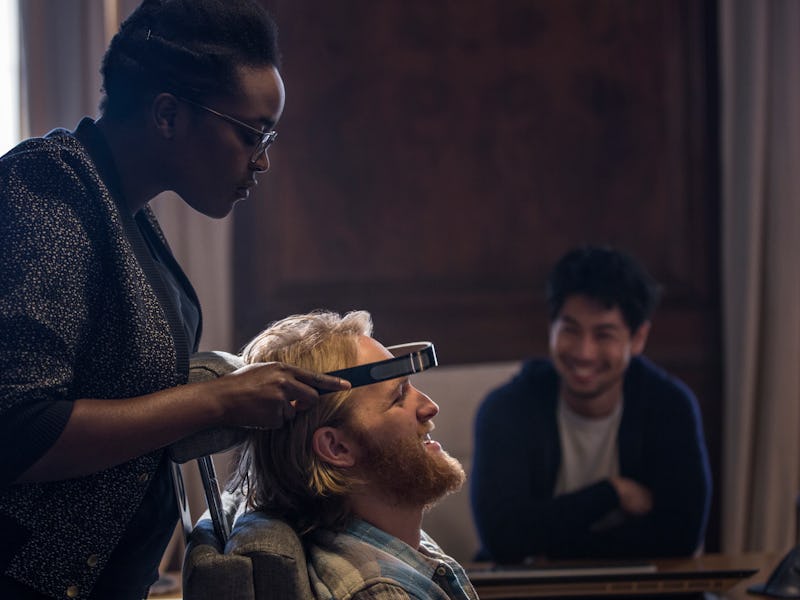Charlie Brooker Fears Big Brother, But He's Cool With Netflix
The man behind 'Black Mirror' doesn't hate data. He just has misgivings about people.

Since its launch in 2011, the British anthology series Black Mirror has offered worse-case scenarios for society’s relationship with technology. Though its episodes are generally set in a near-future, each episode is a projection of contemporary anxieties. In the show’s third season, creator Charlie Brooker has fashioned several different dystopias, all tied together by an underlying uneasiness with mass data collection.
Some episodes, including the 90-minute “Hated in the Nation,” focus on government’s role in secretly collecting data on its citizens, while others, such as “Nosedive” and “Playtest,” examine the personal information we voluntarily give up to corporations who make invasive technologies. Gigantic, damning leaks from whistleblowers like Edward Snowden have made clear just how closely the national security state monitors unwitting citizens, but Brooker’s first real brush with the pervasiveness of the new reality was far more casual in nature.
“I remember once, years and years ago, I was in an open-plan office, and I went to use someone’s computer, went to Amazon, and up popped a load of books on IBS treatment,” Brooker told Inverse. “The person whose computer it was had been looking it up, and it was no business of mine at all. And I remember being really struck by how that was incredibly casual with what could be private information. That’s the alarming thing.”
There are some benefits to data collection, he noted; it’s pretty awesome that Spotify can curate a playlist for him based on his musical tastes, he says, and more significantly, mass collection of medical data has the potential to make real breakthroughs possible. “There is the odd positive too. While we’re all being scrutinized by a giant hovering eyeball that also can hear our thoughts, we’ll be healthy,” he joked.
It is fitting that this season of Black Mirror was produced and released by Netflix. Because it is a streaming service, the company is able to collect and mine vast amounts of detailed information about its customers and their viewing habits. Netflix keeps all that data confidential (unless it wants to trumpet it in a PR blast) and has used it to build a $40 billion business. The fact that it is now the exclusive home for Black Mirror is in itself almost like a dark subplot of a Black Mirror episode.
“It’s certainly interesting that it works that way,” Brooker mused. “I suppose it’s like, what else is [Netflix] going to do with the [viewer] information? Burn it? Anyone who uploads a YouTube video can see the information about when people started playing it, when they bailed; it’s mass focus-grouping in a way.”
Netflix sometimes even keeps the data away from show creators, and Brooker says it doesn’t have a huge impact on the way he writes or produces his show.
“What they don’t do is say, ‘Don’t have that happen in an episode, because the data shows that if you put a man with blue shorts on the screen at this time, then people switch off,’” he said. “There’s never been, ‘Don’t cast this person because our software shows people vomit at the sight of them.’”
Netflix may not have vomit recognition technology yet, but don’t be surprised to see such a device crop up in a Black Mirror episode in the future. For now, Netflix’s data-driven advice has been limited to more logistics and presentation.
“One thing they did suggest: We’ve got a 90-minute episode [“Hated in the Nation”], and they said it’s better to put that later in the run than at the start, because if you start with a 90-minute episode, viewers might not watch two episodes, and we want people to watch more than two episodes,” Brooker explained. “They understand it’s an anthology show with self-contained stories. So theres a very good logical reason for that. And thats literally the only time I think I heard real mention of an algorithm.”